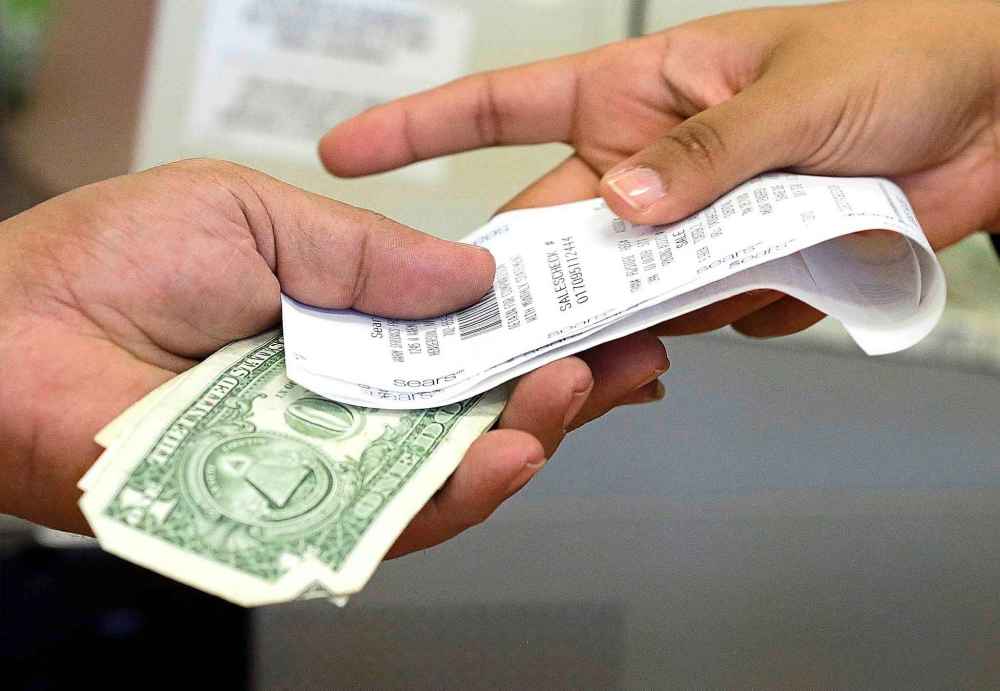Is it time to toss paper receipts entirely?
Read this article for free:
or
Already have an account? Log in here »
To continue reading, please subscribe:
Monthly Digital Subscription
$19 $0 for the first 4 weeks*
- Enjoy unlimited reading on winnipegfreepress.com
- Read the E-Edition, our digital replica newspaper
- Access News Break, our award-winning app
- Play interactive puzzles
*No charge for four weeks then billed as $19 plus GST every four weeks. Offer only available to new and qualified returning subscribers. Cancel any time.
Read unlimited articles for free today:
or
Already have an account? Log in here »
Hey there, time traveller!
This article was published 06/05/2019 (2065 days ago), so information in it may no longer be current.
The lifespan of a printed receipt tends to be rather short and tragic.
It begins when a helpful retail person brightly asks if you want the shiny list of the things you just bought, bearing the name of the store in which you are currently standing, placed in the bag with your purchases.

You don’t, not really, but you say yes. Besides, what if you want to make a return?
The retail person then produces a receipt roughly the length of a toddler. It includes a survey you will never take and an exchange policy you will wilfully ignore. Then, it goes into the bag. Or it stays “with you,” which is the only other choice presented. Sometimes, you will be asked, “Do you want your copy?” The trouble is, your answer doesn’t matter — your copy is printed whether you want it or not.
Then, the receipt gets crumpled and smeared and lost. Your wallet teems with them until you throw them away. They flutter out of your purse and onto the ground. Some receipts are useful — what if you want to make a return? — but the vast majority of them are garbage as soon as they are printed.
Is it time we did away with paper receipts completely?
Receipts are more than just annoying clutter. They may be harmful to your health.
Most are printed on thermal paper using heat as opposed to ink. The paper is coated with bisphenol A (BPA) or bisphenol S (BPS), the chemical that gives receipts their shiny lustre but may give you an endocrinological condition. That’s the concern raised by several studies, including one conducted by Environmental Defence Canada, which concluded consumers — as well as retail workers, servers and cashiers — are exposed to “worrying” levels of BPA and BPS, which can disrupt human hormones.
Concerns about paper receipts prompted California State Assemblyman Phil Ting to introduce legislation that would require large retailers, banks and other businesses to provide paper receipts to customers only on request by 2022.
So far, the Canadian government has not seen fit to ban bisphenols in receipts, which is interesting, considering Canada was the first country to ban BPA in baby bottles in 2010, and the first to declare bisphenols toxic. Health Canada has not concluded receipts are a significant source of exposure to the chemical.
In the smartphone era, there has been a concerted push toward paperless billing and banking, and many retailers now offer emailed receipts.
Of course, there’s consumer resistance to doing away with physical receipts: not everyone has a smartphone, people are hesitant about providing retailers with their email addresses and also, what if you want to make a return?
There would be a cost to retailers, as well, to revamp point-of-sale technology.
That said, it’s not like there is no precedent for change.

Look at single-use plastics. Once the alarm was sounded about the deleterious environmental effects of plastic straws, in particular, businesses from local eateries to major fast-food chains began to overhaul their practices.
Or look at the bags those receipts are being slid into: increasingly, they are not plastic, but reusable cotton and nylon.
These are small, within-our-grasp individual changes that can make a difference, especially when they are bolstered by regulation and legislation.
To borrow a phrase from the infomercial industry, there has to be a better way when it comes to receipts. Looking at all the available evidence, we really shouldn’t want our printed receipts — in our bags, with us or anywhere else.









